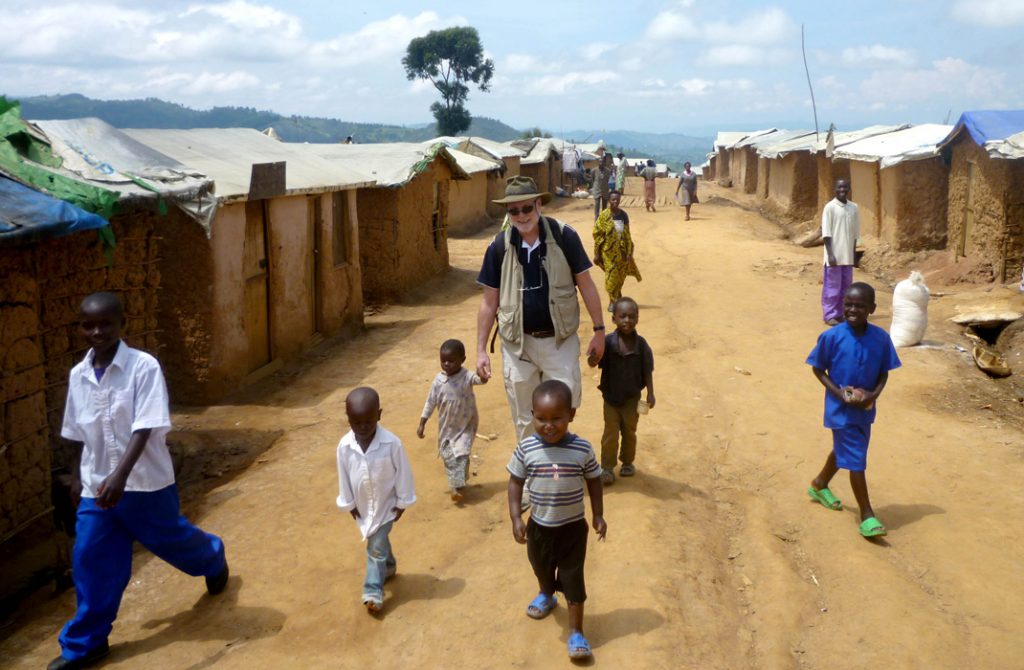Boston College Law School, in partnership with 12 other U.S.-based Jesuit law schools and the Jesuit Refugee Service/USA (JRS/USA), has announced the release of “A Fair Chance for Due Process: Challenges in Legal Protection for Central American Asylum Seekers and Other Vulnerable Migrants.” This report captures efforts to assist asylum seekers and migrants from Central America and to identify challenges in delivering these services. The release of the report coincides with World Refugee Day on June 20.
In the summer of 2014, the number of Central Americans migrating to the United States reached peak numbers. Of particular concern was the high number of unaccompanied and separated migrant children, originating primarily from the Northern Triangle of Central America – Honduras, El Salvador and Guatemala.
In April 2015, a consortium of Jesuit law schools, including BC Law, partnered with JRS/USA — a nongovernmental organization working to advance the rights of refugees and displaced persons around the world —to raise awareness about the plight of children and families from Central America seeking protection in the U.S.
“This partnership is a ground-breaking effort among Jesuit institutions rooted in the Catholic tradition of welcoming the stranger, to identify and call for significant changes in U.S. policies and practices toward migrants,” said Armando Borja, JRS/USA National Director.
Individuals served by BC Law’s Immigration Clinic and Juvenile Rights Advocacy Program, as well as those served by programs at other Jesuit schools, cited a variety of reasons for fleeing their home countries, including violence suffered at the hands of gangs and criminal actors, and violence suffered in the home. For Arturo, a 19-year-old from Honduras, fleeing north was an escape from intense domestic violence. His father abandoned his family and left him with his uncles who would beat him and chain him to the inside of their truck during the day to prevent his escape — eventually he was able to flee to the U.S. to reunite with his mother and sister.
Finding legal representation is one of the first hurdles that migrants arriving in the U.S. face. According to data compiled by the Transactional Records Access Clearinghouse at Syracuse University, only 46% of the unaccompanied children going before Immigration Court are currently represented by an attorney — and more than 81,000 juveniles are still without legal representation.
Jesuit law schools are working to fill this void, serving asylum seekers and other vulnerable migrants from Central America in a variety of ways, including through research, training and direct representation.
Boston College Law School is a leader in the field of immigration law. Professor Dan Kanstroom is the director of the school’s International Human Rights Program and an Associate Director of the Boston College Center for Human Rights and International Justice. Kanstroom, author of Deportation Nation and numerous other books and articles on immigration law, is the founder of the Boston College Immigration Clinic, in which students represent indigent non-citizens and asylum-seekers.
“Working with JRS/USA on this report was a great opportunity for us to look at our clinic’s docket and see the significant number of Central American clients we were helping when there are so many in need,” said Mary Holper, a clinical professor at BC Law and the current director of the School’s Immigration Clinic. “It also was incredibly interesting to put all of their stories and challenges together into one document – I had thought of each client’s story separately, and it was heartbreaking to see how many themes of violence, abandonment, and hope for a better life in the U.S. were common to all of their stories.”
In 2014, BC Law and other Jesuit schools represented 291 asylum seekers and migrants from Central America and anticipate serving almost 300 in 2015.
Through this work, a series of challenges in representing clients were identified, including:
• Procedural challenges in managing the mandated expedited docket for these migrants.
• Legal challenges posed by limitations in the acceptance of gang-related violence claims.
• Logistical challenges related to consistent and reliable access to clients and courts.
• Challenges accessing counseling and support services.
Acknowledging these challenges, BC Law, JRS/USA and the other Jesuit Law Schools recommend the following policy changes:
• Ensure legal representation for minors
• Increase resources for legal representation
• Stop expedited processing for children and families
• Recognize gang-based asylum claims
• Track jurisprudence on gang-based asylum cases
• Minimize movement of clients and increase access to transportation services
• Provide access to counseling services
• Reform the U.S. detention system
• Provide for additional avenues of relief
To learn more and to access the full report, please visit www.jrsusa.org.
Participating law schools are: Boston College Law School, Creighton University, Fordham University, Georgetown University, Gonzaga University, Loyola University Chicago (in close collaboration with the Center for the Human Rights of Children housed at Loyola University Chicago), Loyola University Los Angeles, Loyola University New Orleans, Saint Louis University (in close collaboration with the Catholic Legal Assistance Ministry housed at Saint Louis University), Santa Clara University, Seattle University, University of Detroit Mercy, and University of San Francisco.
Jesuit Refugee Service/USA is an international Catholic non-governmental organization whose mission is to serve, accompany, and defend the rights of refugees and forcibly displaced persons.


